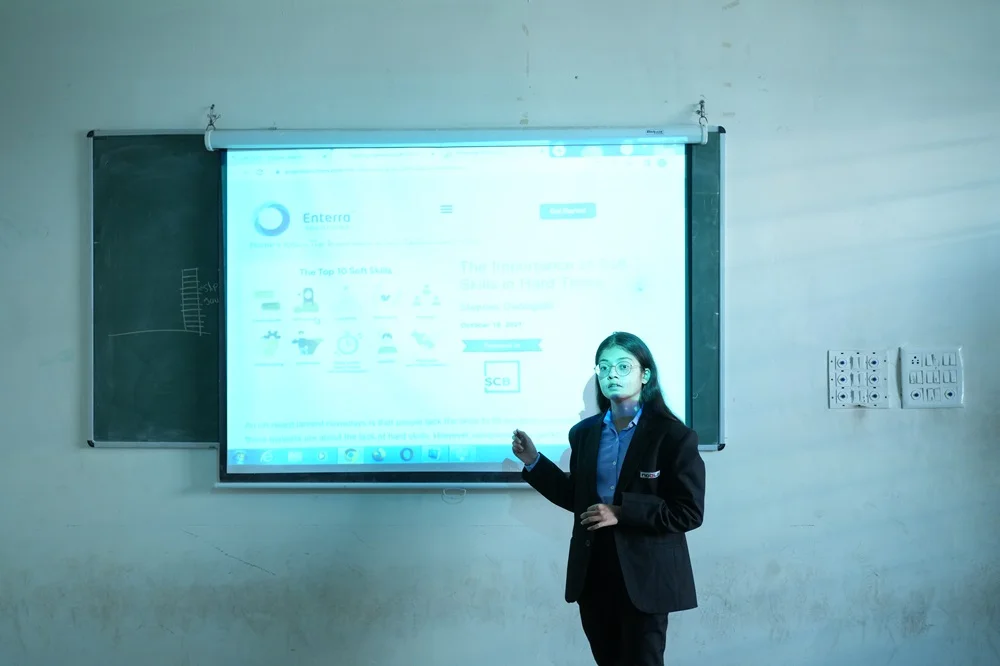
Entrepreneur Cells at Noble University: Campus Startups and Student Entrepreneur Stories
India’s startup ecosystem is booming. According to the Ministry of Commerce & Industry, the country has registered over 150,000 recognised startups as of 2025, making it the third-largest startup hub in the world. But what’s really fueling this growth? Universities and their entrepreneurship cells (E-Cells) are playing a big role, sparking innovation, providing mentoring, and creating platforms where students turn ideas into thriving businesses.
At Noble University, Junagadh, we believe that classrooms build knowledge, but entrepreneur cells build visionaries. Here, student entrepreneurship isn’t just encouraged, it’s nurtured. Let’s dive into the importance of these cells, the role of universities in supporting young innovators, and the inspiring stories of students who are rewriting the rules of success.
What Is an Entrepreneurship Cell?
An entrepreneurship cell in a university is a student-driven initiative supported by faculty and industry mentors. It provides resources, training, and networking opportunities to help students transform ideas into startups. Think of it as the bridge between an idea scribbled in your notebook and a business making a real-world impact.
At Noble University, our Entrepreneur Cell (E-Cell) is a hub of creativity, problem-solving, and collaboration, designed to instil the entrepreneurial mindset among students.

Why Are Entrepreneurship Cells Important in Colleges?
Such cells are crucial because they encourage an entrepreneurial mindset among students, making them more proactive, resilient, and inventive. They also help bridge the gap between classroom learning and real‐world startup challenges, while providing access to startup funding opportunities in universities through government‐led grants or internal seed funds.
Here are some more ways in which entrepreneurship cells benefit students:
- Skill Development Through Entrepreneurship Cells
Students gain hands-on skills in pitching, budgeting, product development, and team building—skills no textbook alone can teach. - Innovation and Creativity in Higher Education
E-Cells promote an environment where risk-taking is celebrated. Students learn to experiment, innovate, and create sustainable solutions. - Networking for Young Entrepreneurs
Through guest lectures, industry workshops, and startup events, students build connections with investors, alumni, and other entrepreneurs. - Startup Mentoring and Incubation Support
From business model validation to securing seed funding, universities provide structured guidance that reduces risks for first-time founders.
Noble University’s Entrepreneurship Ecosystem
At Noble University, the entrepreneurship structure is particularly strong and well-organised. Two key bodies are:
- Noble Entrepreneurship Cell (NEC): A major initiative empowered by the Government of Gujarat’s SSIP 2.0 (Student Startup and Innovation Policy). It gives students a co-working space, basic lab facilities, expert mentoring, and works in alignment with the Institution’s Innovation Council (IIC).
- Entrepreneur Development Cell (EDC): Focused on teaching entrepreneurial skills, providing entrepreneurial education, arranging workshops, guest lectures, competitions, and motivating students to develop their own ventures.
How Do Universities Support Student Entrepreneurs?
Universities are not just centres of learning; they’re becoming startup ecosystems in themselves. At Noble University, students benefit from:
- Entrepreneur clubs and societies that foster collaboration.
- Campus innovation programs where ideas are tested and refined.
- Incubation centres that provide mentoring, co-working spaces, and funding guidance.
- Workshops and hackathons to sharpen entrepreneurial skills.
- Students also receive SSIP 2.0 grants from the Government of Gujarat, which helps with Proof-of-Concepts, seed funding, and innovation programs.
- NEC and EDC organise workshops, seminars, expert talks, and ideathons so that students can connect with experienced entrepreneurs and innovators.
By combining academic strength with entrepreneurial freedom, universities prepare students to run businesses while studying, without compromising either.
Campus Startup Success Stories: Students Who Inspire
Across India, many student-led business ventures started in campus dorms or cafeterias and grew into unicorns. Think of Flipkart, Zomato, and Ola, whose founders began as college students with a vision. Many students are also exploring opportunities for entrepreneurship in Junagadh, all thanks to the increased backing they receive from educational institutions.
In Junagadh too, students are taking bold steps, launching apps, eco-friendly ventures, and social enterprises. With Noble University’s entrepreneurial mentoring and incubation support, we are building the next wave of leaders who will not only create jobs but also solve real-world problems.



Challenges Student Entrepreneurs Face and How Noble Helps Overcome Them
Starting a business, even in a supportive environment, is never easy. Students may come across several challenges, such as:
- Balancing academics with startup responsibilities
- Lack of clarity about funding, mentorship or business planning
- Limited funding and investor exposure
- Fear of failure and lack of industry experience
- Building the right team at an early stage
- Limited exposure to what real startups face
This is exactly where entrepreneurship cells step in, helping students overcome these challenges with structured support and resources. Noble University, via its EDC and NEC, helps students overcome these challenges by:
- Organising expert talks and seminars, including sessions on success and failure stories. These demystify entrepreneurship.
- Offering courses and electives related to entrepreneurship to build skill development through entrepreneurship cells.
- Connecting students to government policies and supports like SSIP 2.0, state and national schemes.

Noble University’s Role in Student Entrepreneurship
At Noble, we don’t just prepare students for jobs; we prepare them to create jobs. Our Entrepreneurship Cell is designed to:
- Mentor budding entrepreneurs through expert guidance
- Provide access to startup funding opportunities in universities
- Encourage students to participate in innovation competitions and state-level events
- Build an ecosystem where creativity, innovation, and business meet
Ready to Write Your Own Startup Story?
At Noble University, we believe every student carries the potential to innovate, disrupt, and inspire. With the right ecosystem, mentorship, and opportunities, a simple idea can transform into a venture that changes lives.
Want to be part of this startup revolution? Explore Admissions opportunities at Noble University or connect with us via our Contact Page to know how Noble supports student entrepreneurship in universities.
FAQS
It’s a dedicated student-driven body that supports innovation, startup development, and entrepreneurial learning, helping students transform their ideas into ventures.
They offer mentoring, workshops, incubation support, and networking opportunities with investors and industry leaders, reducing barriers for first-time founders.
Nationally, ventures like Flipkart and Ola began as campus startups. At Noble, students are exploring startups in tech, sustainability, and social entrepreneurship with active support from the Entrepreneur Cell.
By providing incubation centres, seed funding, expert mentoring, and platforms like hackathons, where students can showcase and refine their ideas.
Yes, with the right balance. E-Cells at Noble ensure students manage academics while pursuing entrepreneurial ventures through flexible mentorship programs.
Leadership, communication, problem-solving, financial literacy, and the confidence to take calculated risks.
They provide infrastructure, mentorship, and access to funding opportunities, acting as safe launchpads for early-stage startups.
Because it promotes independence, innovation, and job creation in a competitive world where traditional career paths are rapidly changing.
From limited funding to time management, student entrepreneurs often juggle multiple roles. Entrepreneurship cells provide guidance to overcome these barriers.
Even if a student’s startup doesn’t succeed immediately, the skills, network, and experience gained give them an edge in placements and future career paths.


